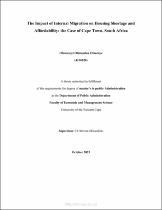| dc.description.abstract | Cape Town faces a significant housing shortage and affordability challenge, a situation exacerbated by internal migration dynamics. Internal migration in South Africa is driven primarily by regional disparities at the macroeconomic level and a fundamental dearth of employment opportunities, resulting in suboptimal living conditions among diverse socioeconomic strata. Urbanization in South Africa is a pressing concern, characterized by uncontrolled growth in slums and informal settlements and a persistent inadequacy of suitable housing options. Within this context, this study examines the ramifications of internal migration on housing shortages and affordability in Cape Town. This study is motivated by a United Nations projection, which predicts that South Africa will see an increase in the urban population, with an estimated 71.3% of the population residing in urban areas by 2030. This projection underscores the importance and relevance of the present study. To comprehensively grasp the impacts of internal migration on housing, this study draws on three theoretical frameworks: the Migration-Residence (M-R) model theory, the Push-Pull-Mooring Migration Model (PPM model), and the Agglomeration Theory. It employs mixed methods that encompass both qualitative and quantitative research techniques, and analyzes secondary data using descriptive statistics. The findings highlight how internal migration significantly affects urbanization, housing demand, and sociopolitical inequalities in Cape Town. Multiple factors, including a robust local economy, internal migration flows, and a flourishing tourism sector, collectively contribute to this phenomenon. Furthermore, the research reveals Cape Town's attractiveness as a destination for internal migrants, exerting considerable strain on its infrastructure, public services, job markets, and availability of affordable housing. Considering these findings, the principal recommendation of this study pertains to the incentivization of private sector investors and developers through initiatives that support housing affordability and shortage reduction. Establishing partnerships and fostering collaborations are proposed as strategic avenues to stimulate engagement in affordable housing initiatives, thereby ameliorating the prevailing housing crisis. | en_US |

